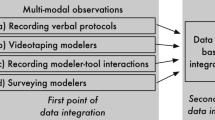Abstract
In this paper, we report on our experience in teaching conceptual modeling at a master-level course at the University of Trento. We use our experiences to argue that systematic model analysis is an important factor that influences learning and understanding of conceptual modeling techniques. In particular, we have observed this effect with the i* goal-oriented language. In previous years students were required to perform only modeling as part of their projects, while in the last year they were also required to apply systematic analysis. We observe that i* analysis not only allows students to evaluate the satisfaction of goals in their model, but also to better understand their models, helping to refine models until they are more meaningful and more likely to fulfill their intended purpose.
Access this chapter
Tax calculation will be finalised at checkout
Purchases are for personal use only
Similar content being viewed by others
References
Asnar, Y., Giorgini, P., Mylopoulos, J.: Goal-driven risk assessment in requirements engineering. Requirements Eng. 16(2), 101–116 (2011)
Horkoff, J., Barone, D., Jiang, L., Yu, E., Amyot, D., Borgida, A., Mylopoulos, J.: Strategic business modeling: representation and reasoning. Softw. Syst. Model. 13(3), 1015–1041 (2014)
Horkoff, J., Elahi, G., Abdulhadi, S., Yu, E.: Reflective analysis of the syntax and semantics of the i* framework. In: Song, I.-Y., Piattini, M., Chen, Y.-P.P., Hartmann, S., Grandi, F., Trujillo, J., Opdahl, A.L., Ferri, F., Grifoni, P., Caschera, M.C., Rolland, C., Woo, C., Salinesi, C., Zimányi, E., Claramunt, C., Frasincar, F., Houben, G.-J., Thiran, P. (eds.) ER Workshops 2008. LNCS, vol. 5232, pp. 249–260. Springer, Heidelberg (2008)
Horkoff, J., Yu, E.: Analyzing goal models: different approaches and how to choose among them. In: Proceedings of the 2011 ACM Symposium on Applied Computing, pp. 675–682. ACM (2011)
Horkoff, J., Yu, E.: Interactive goal model analysis for early requirements engineering. Requirements Eng. 97, 1–33 (2014)
Karagiannis, D., Junginger, S., Strobl, R.: Introduction to business process management systems concepts. In: Business Process Modelling, pp. 81–106. Springer, Heidelberg (1996)
Koch, M., Landes, D.: Modeling software engineering education with i. In: Proceedings of iStar 2014 (2014)
Monsalve, E.S., Liete, J.C.S.d.P., Werneck, V.M.B.: A case study to evaluate the use of i* for helping pedagogy transparency. In: Proceedings of iStar 2014 (2014)
Paja, E., Dalpiaz, F., Giorgini, P.: Managing security requirements conflicts in socio-technical systems. In: Ng, W., Storey, V.C., Trujillo, J.C. (eds.) ER 2013. LNCS, vol. 8217, pp. 270–283. Springer, Heidelberg (2013)
Paja, E., Horkoff, J., Mylopoulos, J.: The importance of teaching goal-oriented analysis techniques: an experience report. In: Proceedings of iStarT 2015 (2015)
Yu, E.: Modelling strategic relationships for process reengineering. Ph.D. thesis, University of Toronto, Canada (1996)
Yu, E., Giorgini, P., Maiden, N., Mylopoulos, J.: Social Modeling for Requirements Engineering. MIT Press, Mylopoulos (2010)
Zachman, J.: The zachman framework for enterprise architecture. Zachman International (2002)
Acknowledgements
This research was partially supported by the ERC advanced grant 267856, ‘Lucretius: Foundations for Software Evolution’, www.lucretius.eu. Jennifer Horkoff is supported by an ERC Marie Skodowska-Curie Intra European Fellow-ship (PIEF-GA-2013–627489) and by a Natural Sciences and Engineering Research Council of Canada Postdoctoral Fellowship (Sept. 2014 - Aug. 2016).
Author information
Authors and Affiliations
Corresponding author
Editor information
Editors and Affiliations
Rights and permissions
Copyright information
© 2015 Springer International Publishing Switzerland
About this paper
Cite this paper
Paja, E., Horkoff, J., Mylopoulos, J. (2015). The Importance of Teaching Systematic Analysis for Conceptual Models: An Experience Report. In: Jeusfeld, M., Karlapalem, K. (eds) Advances in Conceptual Modeling. ER 2015. Lecture Notes in Computer Science(), vol 9382. Springer, Cham. https://doi.org/10.1007/978-3-319-25747-1_34
Download citation
DOI: https://doi.org/10.1007/978-3-319-25747-1_34
Published:
Publisher Name: Springer, Cham
Print ISBN: 978-3-319-25746-4
Online ISBN: 978-3-319-25747-1
eBook Packages: Computer ScienceComputer Science (R0)




